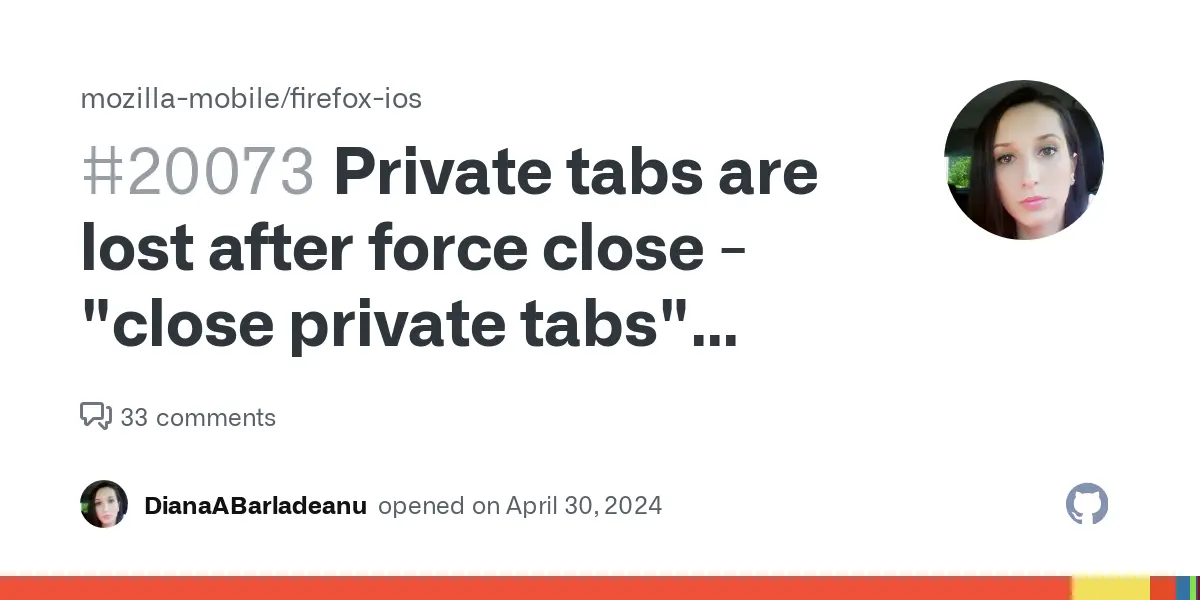I almost exclusively use private tabs and had quite a few of them open at any time for things I was working on. But apparently since I’ve last updated the default behavior changed to close private tabs and the option to keep them open was removed.
Digging into it, I’ve found the bug report in the link. The last entry in the bug report is concerning:
It looks like this was discussed in FXIOS-8672, although I don’t have access to that JIRA to take a look at the discussion.
Of the three PRs that I see that reference FXIOS-8672, one of them mentions:
I’ve intentionally kept this PR as simple as possible so we can release it and then be sure there is no major blow back from users. If we need to roll back it should be very simple in the current state.
I’m not sure what would count as “major blow back” but there is at least some hope that this functionality can be restored.
I agree with @garnetred that this behaviour isn’t limited to force closing the app.
Why do you use private tabs if you keep them open? That defeats the whole purpose.
Private tabs do not grant privacy on the open web I.e your data is still sent to Google
Private tabs tab give you local privacy - only local data history is not stored, downloads not logged, etc.
Edit: and the answer is!!! private mode could be used in place of a profile for different website sign ins. Creative.
You could have two different website sessions logged in at the same time using regular and private tabs. This was much more convenient than having to open a different browser. I hope they plan to release container tabs soon.
Not sure why the OP would prefer private tabs though.
Edit: forgot OP asked about IOS, not desktop…
That is a fair point.
Firefox profiles is not well integrated or known.
On windows, in the run dialog (win+R) type
firefox.exe -pto open the profile wizard. You can also make custom shortcuts but I don’t recall the exact command.If you sign in with the same Firefox account on both profiles to sync bookmarks and stuff, the only thing different would be what ever you’re signed into.
Thanks for the info, but this post is about iOS.
Shoot, I forgot that part. My bad lol
They don’t stay open very long, but I certainly am not expecting them to close just because I haven’t used my phone for a couple hours. At any rate, I want to decide when they close.
Wait… private tabs sends info to Google? How? Do you mean by clicking analytics links?
https://www.mozilla.org/en-US/firefox/browsers/incognito-browser/
Incognito mode keeps your browser history private, and that’s pretty much it. If you want more privacy, you’ll need to add Tracking Protection and maybe even browse through a Virtual Private Network (VPN) service. Incognito mode can’t.
Ok, sure. But this is common knowledge. Private browsing is about not leaving trace on the local machine. It was never about remaining anonymous on the internet.
I thought you were referring to the browser sending browsing history to Google somehow.
Its less common than you think. Google just went through a lawsuit over this.
https://www.npr.org/2023/12/30/1222268415/google-settles-5-billion-privacy-lawsuit
I don’t typically root for Google anymore, but this one is silly. Its alway stated websites will still track you. Google is a website like other everyone.
LMAO. Imagine thinking this is a bug.
I’d consider it a bug if the existing option was removed. Private tabs are nice if I intend to return to the page at a later date. I prefer Firefox Focus for one and done private browsing.
Silently changing a behavior, especially one that is in other web browsers, is a bit user-hostile and I understand the frustration.
On the other hand, privacy-wise this change is good, since it was likely storing the incognito tabs (browser state) in the app storage and was likely retrievable by forensics tools (ie: Cellebrite).
I’d rather have the browser state of incognito tabs stored in RAM at all time.
I feel like those affected are using incognito tabs as a way to separate their browsing history. Maybe a more convenient option would be the ability to run multiple browser sessions on mobile instead of falling back on the incognito mode as a workaround.
They had an option to close the private tabs, which was on by default. I’ve changed it to off for a reason. Breaking people’s workflow for a false perceived gain in privacy is bull. Private tabs are just local storage cleaning tabs. Pretending this change improves privacy is nonsense.
I think this is the behaviour most people expect. Coming back hours later and finding your old private tabs still in the browser seems to defeat the purpose of using private tabs.
Please read the bug report. They’ve removed the setting where you could select whether the tabs remain or not.
You might consider seeing if Container Tabs paired with the Temporary Containers addon serves your need. With that setup, every new tax you open is isolated from the local storage of your other sessions, much like private browsing. You can also set up defined containers for sites you want to remember the state of.
Oh, if I could add add-ons to iOS, this bug wouldn’t exist:
Add-ons are not compatible with Firefox for iOS. Try installing them on Firefox for desktop.
As of now, the only way to have a page not leave cookies and local storage in your device when you leave it is by opening it on a private tab.
Oh crazy, there’s no add-ons on iOS? I had no idea; I avoid Apple.
So do I. My company does not. Neither does Mozilla, though it appears they’re changing their mind.




